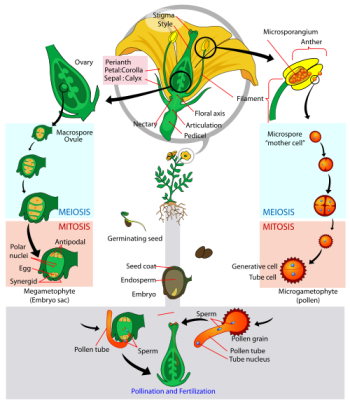Reproduction
Zantedeschia aethiopica is an angiosperm which goes through
alternation of generations. Alternation of generations goes
between a sexual phase also known as the gametophyte stage, and
a nonsexual phase which can be referred to as the sporophyte
stage. As plants have evolved over time, the gametophyte stage
has been condensed, and the dominant stage of an angiosperm is
the sporophyte phase. While this form of reproduction is often
associated with plants, there are some animals that also have an
alternation of generation s. For example, the
box jellyfish (Chironex fleckeri) also undergoes alternation
of generations as its means of reproduction.
s. For example, the
box jellyfish (Chironex fleckeri) also undergoes alternation
of generations as its means of reproduction.
The flower of an angiosperm is where the reproductive process
occurs. The stamen is the male reproductive organ and has what
is called an anther located at the tip. The anther is where
pollen is produced. The female organ of the flower is inside the
pistil. Inside the pistil sits the ovary where seeds are later
produced. The male portion resides in the top 7 cm of the flower
whereas the female reproductive organ sits in the lower 1.8 cm
of the flower. Note that because an angiosperm has both male and
female parts it is a monoecious organism. The opposite of
monoecious is dioecious where the male and female reproductive
organs are on separate plants.
